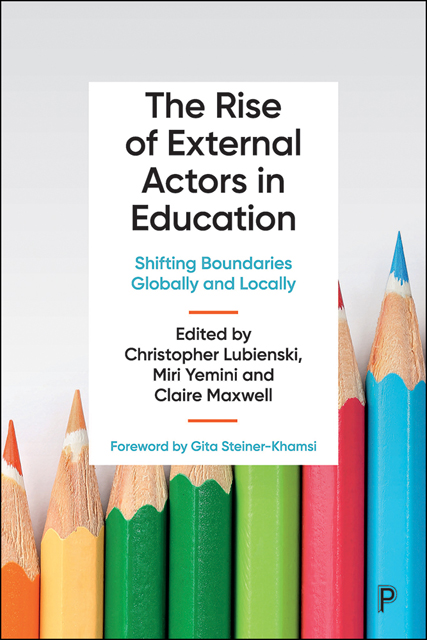Book contents
- Frontmatter
- Contents
- List of figures and tables
- Notes on contributors
- Foreword
- Introduction
- 1 Collective parental involvement: an in-between actor
- 2 When teachers become the external actor: private tutoring and endogenous privatisation in Cambodia
- 3 Cross-sectoral alliances in charter schools: the role of boards of directors from for-profit and non-profit sectors
- 4 A communitarian framework for understanding the relations between schools and NGOs
- 5 PISA for sale? Creating profitable policy spaces through the OECD’s PISA for Schools
- 6 Historical reconfigurations of internal/external actors in Danish educational testing practices
- 7 A short history of external agency involvement within education in contemporary Poland
- 8 New philanthropy in the heterarchical governance of education in Brazil
- 9 Venture philanthropy and the rise of external actors in Australian education
- 10 Power struggle in education policy change: the role of knowledge actors in structural reforms in Chile
- Conclusion: Complexity and intentionality of external actors in education
- Index
Foreword
Published online by Cambridge University Press: 13 October 2022
- Frontmatter
- Contents
- List of figures and tables
- Notes on contributors
- Foreword
- Introduction
- 1 Collective parental involvement: an in-between actor
- 2 When teachers become the external actor: private tutoring and endogenous privatisation in Cambodia
- 3 Cross-sectoral alliances in charter schools: the role of boards of directors from for-profit and non-profit sectors
- 4 A communitarian framework for understanding the relations between schools and NGOs
- 5 PISA for sale? Creating profitable policy spaces through the OECD’s PISA for Schools
- 6 Historical reconfigurations of internal/external actors in Danish educational testing practices
- 7 A short history of external agency involvement within education in contemporary Poland
- 8 New philanthropy in the heterarchical governance of education in Brazil
- 9 Venture philanthropy and the rise of external actors in Australian education
- 10 Power struggle in education policy change: the role of knowledge actors in structural reforms in Chile
- Conclusion: Complexity and intentionality of external actors in education
- Index
Summary
‘Breaking the state monopoly’ was the rallying call of those parties and interest groups of the 1980s and 1990s that, first in Australia, New Zealand, the UK, and the US, and soon after in every corner of the world, advocated for fundamental reforms in the public sector. Theirs was a coherent yet highly contested approach to improving the quality of education: incite schools to compete over student enrolment by regularly testing students’ learning outcomes, make the test results publicly available, enforce choice, and put a funding formula in place that finances schools based on student enrolment, regardless of whether the school is run by the state or a nonstate entity. Announced with great fanfare, the revamping of education systems was supposed to unleash the innovation potential of schools, boost community participation, bleed out poorly performing schools, and hold teachers and schools accountable for the learning outcomes of their students.
Today, three or four decades later, the time of disillusionment has arrived. There is agreement that the neoliberal reforms have led to excessive testing, exacerbated social inequality between schools, and opened the floodgates to private providers. What is less clear is how these neoliberal reforms, in particular the incorporation of the private into the public sector, has been ‘translated’ into various national settings. Rather than reiterating the obvious – the dramatic increase of non-state actors in the education sector – this edited volume, written by some of the most prolific thinkers on privatisation in education, disaggregates private sector providers and zooms in on how the various types of ‘external’ actors run schools, how they manage to stay or, rather, grow their business, and how some of them have managed to expand their influence by transitioning from being merely a supplier to a government partner in agenda setting and policy formulation. The fundamental reforms implied a new role for the state, new ways of regulating the education system, and new tools for generating or alleviating reform pressure.
From the myriad of fascinating phenomena illuminated in this book, I would like to highlight two that, on closer examination, are intertwined: the demise of public education as a good public good and the blurred line between external and internal actors in education.
- Type
- Chapter
- Information
- The Rise of External Actors in EducationShifting Boundaries Globally and Locally, pp. xii - xviPublisher: Bristol University PressPrint publication year: 2022



